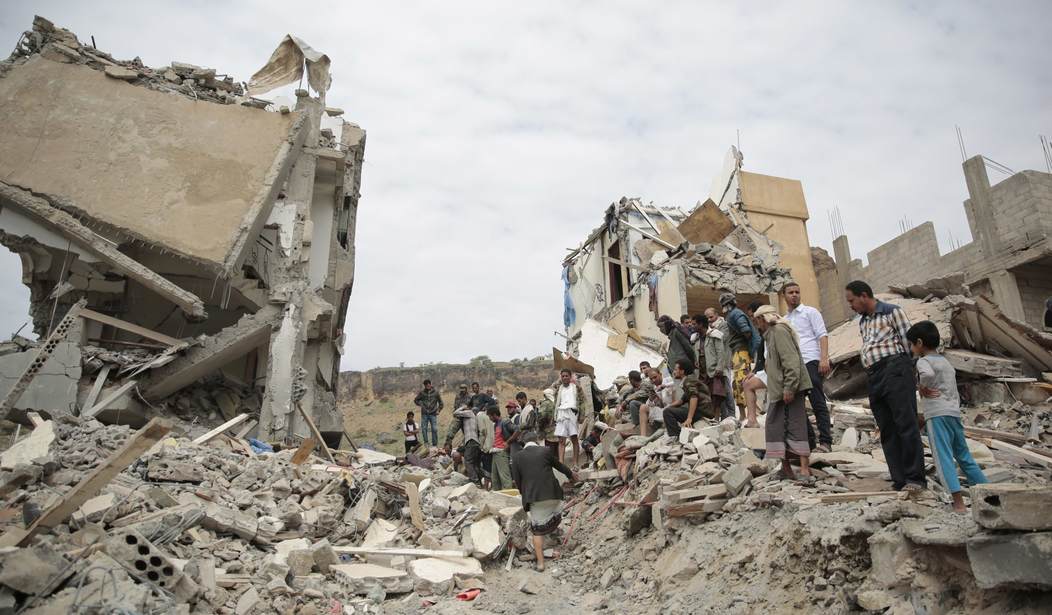ARLINGTON, Va. — Defense Secretary James Mattis on Friday defended U.S. efforts to prevent civilian casualties in the Yemen war, suggesting reporters focus on the “industrial-level” killing of the Assad regime over civilian deaths in pinpoint Saudi-led strikes.
Jamie McGoldrick, the United Nations Humanitarian Coordinator for Yemen, slammed the Saudi-led coalition Thursday for “complete disregard for human life” after airstrikes on a market and farm this week killed 68 people, including at least eight children at the Taiz Governorate market and 14 members of the same family at the farm in Al Hudaydah Governorate.
“I remind all parties to the conflict, including the Saudi-led Coalition, of their obligations under International Humanitarian Law to spare civilians and civilian infrastructure and to always distinguish between civilian and military objects,” said McGoldrick. The UN says more than 5,000 civilians have been killed since Saudi intervention in the Yemen civil war began in 2015.
Washington supported Saudi strikes from the outset with intelligence and logistics and has continued to do so in the Trump administration, despite growing discontent from some lawmakers.
Speaking with reporters today, Mattis was asked what U.S. training has done if Saudi strikes keep killing civilians.
“What we’re going to do is we’re going to continue to train them how to do target identification, try to get their capabilities up in those areas. We’re going to continue to work with their pilots in explaining how you do bombing runs, that sort of thing — anything we can do to limit the civilian casualties, we will be doing,” he replied. “At the same time, for the Houthis to put weapons in the residential areas — and this has been shown not just by us, but by other people — that doesn’t help, if they’re sincerely concerned about civilian casualties.”
“We acknowledge that civilians have died. We do not want to see this happen. We have been trying to get this to …the negotiating table for years now, and that’s probably the bigger effort is to end the fighting there. But, in the interim, we’re going to try to make that army, that military of the Saudis more capable of carrying out what they find to be their military necessity, without killing innocents.”
Mattis noted that “this is the first time in the history of warfare when we’ve had this level of precision that we’ve achieved” with weapons, yet “people are being held to a standard today that warfare can seldom permit achieving.”
“The costs of war throughout history — and it has not changed — are more heavily borne by civilians, as far as I’m concerned, in almost every war in history,” the Defense secretary added. “And anyone who thinks that, in our own Civil War, the people of the South didn’t bear a heavier price than the armies themselves — we only have to look at the people who lived in Vicksburg or Richmond or Atlanta in order to carry that thesis forward. The civilians always carry a disproportionate burden… our aim is to bring that number down to the absolute humanly possible minimum.”
“…We’re not perfect — I leave perfection to God. We’re going to do our best to reduce the numbers and try to get this thing to the UN-brokered negotiating table.”
Mattis continued, “How do I point out the number of times that civilians did not die because of what we’ve been doing, because of systems we’ve put on the airplanes over many years that allow them to be more pinpoint?”
“I can quite assure you that, at the same time, we’re rightly, rightly concerned. We’re working with them. We’ve got the UN, we’ve got the diplomatic effort going. We’ve got the military effort. We’ve got training efforts. We’ve got people teaching them how to do target analysis. It’s not perfect, I understand all that,” he said. “How many of you are writing, right now, about what’s going on in Syria at the industrial level that would dwarf this from any measure, any objective measure?”
Asked what he meant by “industrial level,” Mattis clarified he meant “the killing tens of thousands of people by the Assad regime, of their own people.”
“And it’s as if that gets a bye because, well, we can’t influence them. Meanwhile, down here, where we’re having some influence, some success, because it’s not getting the level that we would all love to see, which is not one innocent person — not one innocent person killed or wounded or traumatized — that we’re not successful. That becomes the story,” he said. “…All this is going on, and we don’t even address it anymore. We just expect Assad will drop barrel bombs on people on purpose. Down at Saudi, no one’s saying they’re doing it on purpose, or if they are, it’s usually someone who’s an advocate for — whether it be the Houthis, or whatever.”
It was noted to Mattis that “every news organization represented in this room has significantly covered” Bashar Assad’s mass killing of civilians.
“They have,” Mattis acknowledged. “…But our discussion here today is about what we’re not getting right down in Yemen.”
Later Mattis was asked how he feels about the media. “I don’t have any problem with the press,” the Defense secretary replied.








Join the conversation as a VIP Member